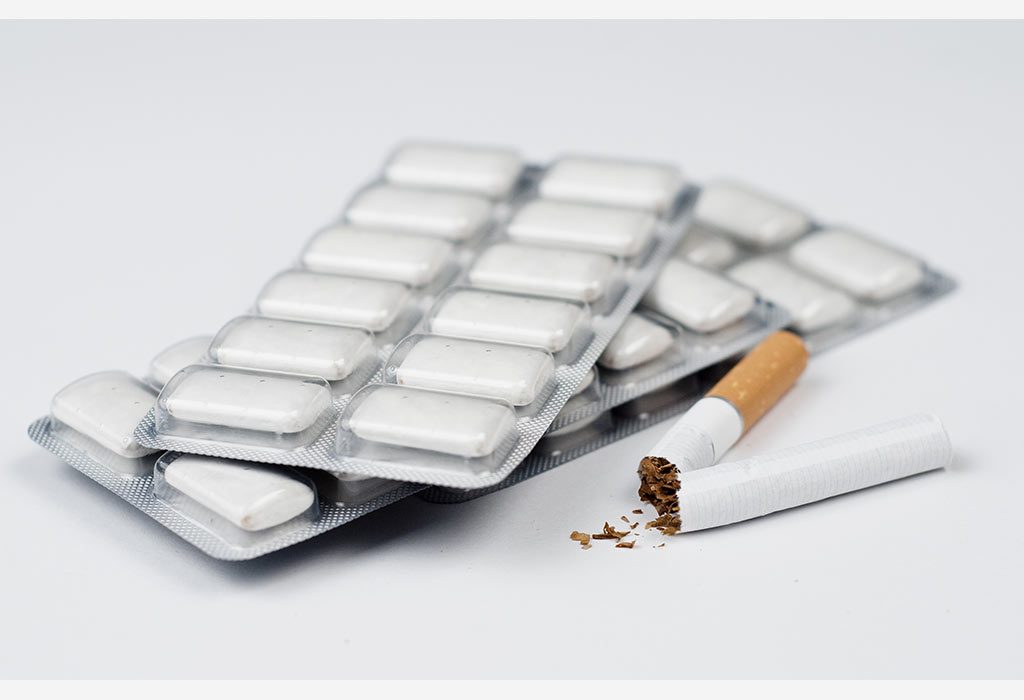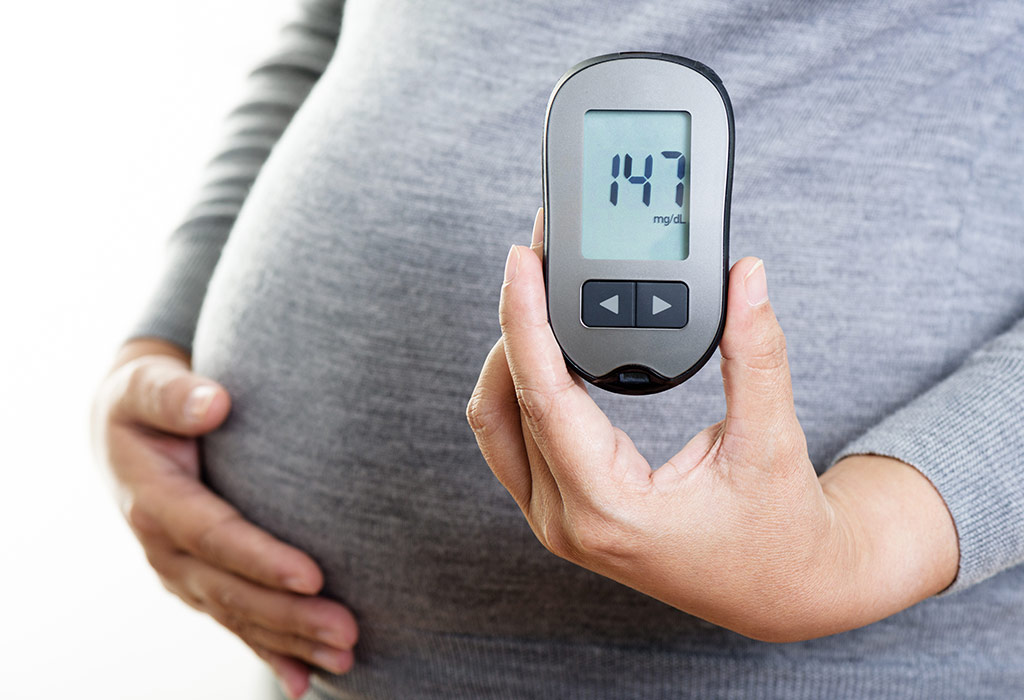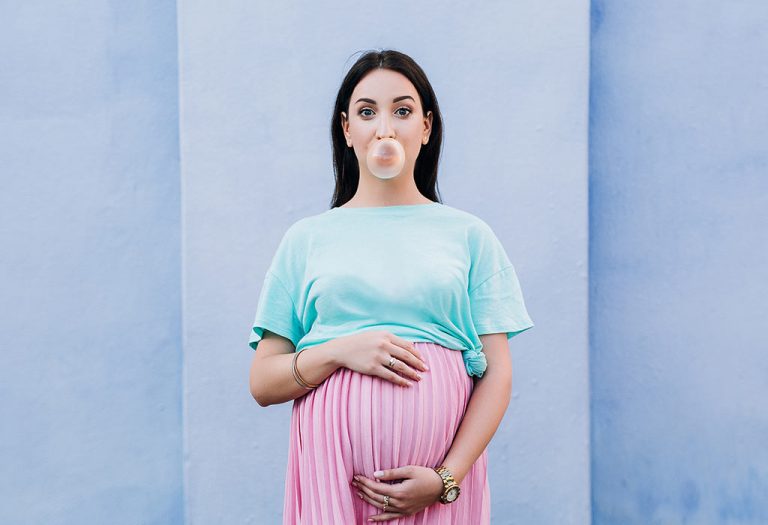Chewing Gum During Pregnancy – Is It Safe?

Chewing gum is so common that many people wouldn’t think twice before buying a packet. It can be used as a mouth freshener or simply to be more alert. Many pregnant women have found that chewing on flavoured gum also helps in reducing morning nausea, which is common during pregnancy. However, chewing gum is not a natural food item after all. It contains various artificial flavours and substances, making it crucial to understand the safety of chewing gum while pregnant. So, is chewing gum during pregnancy safe? With the help of this article, we will learn about the benefits of eating gum during pregnancy. We will also take a look at safe chewing gum when pregnant.
Can You Chew Gum While Pregnant?
On a general note, chewing gum once in a while is generally safe, as long as your pregnancy is free from complications or there is no chance of a risky delivery. If you are on a specific diet that keeps your calorie intake under control or sugar levels at a minimum, the amount of gum might have to be reduced further. Artificial sweeteners are substances included in food products to provide sweetness without using sugar, and they can be either nutritive (containing calories) or non-nutritive (lacking calories) (1).
What Is Chewing Gum Made Of?
Chewing gum is manufactured artificially, which makes it evident that it will contain various chemicals and synthetic ingredients. The variety of flavours is created artificially, the colours are artificial as well, and the major constituents of the taste come from chemical sweetening agents or even corn syrup. These might seem completely unfit for a baby, but an occasional gum doesn’t seem to cause much harm.
What Artificial Sweeteners Are Added to the Chewing Gum, and Are They Harmful?
Chewing gums labelled “sugar-free” are replete with artificial sweeteners. Artificial sweeteners are of two types: one is nutritious and contains calories, and the other is non-nutritious and does not contain calories. You can consume artificial sweeteners during your pregnancy in moderate quantities after consulting with your doctor.
Benefits of Chewing Gum While Pregnant
If you are pregnant, you can expect the following benefits from chewing gum.
- Research from the American College of Obstetricians and Gynecologists (ACOG) indicates that chewing gum containing xylitol can enhance oral health by decreasing oral bacteria, posing no risk to pregnant women (2).
- During pregnancy, women often experience a metallic taste and dry mouth. Chewing sugar-free, mint-flavored gum can stimulate saliva production, help eliminate the metallic flavor, and aid with dry mouth and unusual taste (3).
- If you are on a diet to control your weight, chewing gum is a great way to manage those food cravings. The simple act of chewing on something can trick your body into feeling that food intake is taking place, thereby reducing cravings for a while.
- Nausea in the morning or evening is a fairly common experience during pregnancy. There are several techniques, ranging from deep breathing to smelling a bar of soap, that can help reduce nausea. Gum contains stevia, which is linked to reducing the feeling of sickness or nausea (4). Combined with the act of chewing, your body can find some relief and return to normal, further helped by the taste and smell of the gum.
- Pregnant mothers keep undergoing repeated instances of heartburn after a meal. By chewing on gum, the saliva production in the mouth increases, which finds its way into the stomach and helps in countering any residual stomach acid (5).

Side Effects of Chewing Gum During Pregnancy
While there are benefits, eating gum during pregnancy also comes with its own caveats. Here are the side effects of chewing gum during pregnancy (6):
- The artificial sweeteners in gums and flavours can directly cause dental issues and may also be irritating during pregnancy.
- Sorbitol is a widely used sweetener in chewing gum, which is also responsible for the inflation of the gut. At times, this could affect the foetus and cause a restriction in its normal growth. Excess use of sugar-free chewing gum containing sorbitol may increase the risk of diarrhoea and cramps (7).
- Certain gums also contain sucralose. While sucralose does not directly increase the blood sugar levels, regular consumption of sucralose may increase the risk of type 2 diabetes by impacting gut health and causing insulin resistance and diabetes.
- The constant act of chewing can weaken the cartilage muscles of the mouth that are present to cushion the jaw from any impact. If they get damaged, there will be constant pain in the mouth.
- In certain mothers having phenylketonuria, the aspartame chemical present in chewing gum can directly affect the foetus and bring more harm.
- Several sugar-free chewing gums contain aspartame as a synthetic sweetener (8). However, consumption of aspartame during pregnancy is linked to the impairment of the structure, growth, and function of the placenta (9).
- For mothers who use nicotine gum as an alternative to stop smoking for the baby’s benefit, it is necessary to know that nicotine gum is not a healthy choice either. Nicotine is the core addictive substance, and if it reaches the baby’s blood, it can be responsible for cardiovascular problems later in life.
What Happens If You Accidentally Swallow a Chewing Gum During Pregnancy?
Although you should never swallow gum, mistakenly swallowing a piece of gum will not harm you or your baby. It will travel through your digestive system and get excreted in your stool (10).
What Chewing Gums Are Safe for Pregnant Women?
Is a sugar-free chewing gum safe during pregnancy, and with what components? Let’s learn about the chewing gums that are deemed safe during pregnancy.
1. Gums with xylitol as a constituent
Many popular brands contain an alcohol molecule of a sugar termed xylitol. If this is the core component, then the gum is safe for pregnant women in decent amounts.
3. Gums that have sucralose as a sweetener
Just like aspartame, sucralose is another artificial sweetening agent that contains no calories and is found in many chewing gum brands. It is beneficial because it doesn’t affect blood sugar levels and maintains overall health.
4. Gums containing nicotine as a constituent
Though these are never recommended as recreational chewing gums, they are used by mothers to counter their need for smoking. Although it might help increase the weight of the baby, the presence of nicotine should always be kept to a minimum.

Chewing Gums Which Are Unsafe During Pregnancy
The following chewing gums should not be chewed if you are pregnant.
1. Gums with saccharine as a constituent
There have been many controversies around this ingredient since many food organisations deem it safe, but actual results have produced exceptions. Even though found in many food items and drinks, once inside the body, saccharine can very easily reach the foetus via the placenta, and could possibly harm the growth of the child.
2. Gums with sorbitol present in them
Sorbitol does have sweetening properties, but those are accompanied by its nature as a laxative. Consuming such chewing gums could even cause diarrhoea and other intestinal issues. At times, it is known to absorb nutrients and prevent them from reaching the foetus, too.
3. Gums with aspartame as a sweetener
Aspartame is a sweetener used in many chewing gums, although it doesn’t provide any nutrition since it is artificial. Only in cases where the mother has PKU are such chewing gums highly advised against. This is primarily due to the body’s inability to break down phenylalanine, present in the aspartame, which causes it to be stored in the body and start affecting the baby adversely.
When Should You Completely Avoid Chewing Gum?
If you can identify with the following, you should not be chewing gum at all.
- If you have elevated sugar levels due to the onset of pregnancy-induced diabetes, you should avoid chewing gum.

- If doctors have deemed your body to be resistant to insulin, sweetened chewing gum should be totally restricted at all costs.
- Common diabetes, such as diabetes mellitus, requires sugar levels to stay absolutely within a safe range throughout pregnancy. Chewing gum could fluctuate these levels and create complications.
Precautions Pregnant Women Should Keep in Mind While Chewing Gum
The following precautionary measures are recommended for pregnant women before and after chewing gum.
- Floss after chewing the gum.
- Stop chewing any gum one month prior to the due date.
- Check the constituents of the chewing gum carefully.
- Make sure you don’t swallow the gum at any cost.
- Opt for unsweetened gum if possible.
- Avoid gums that have menthol or mint flavours in them.
- Chew gum in moderation.
- Stay away from nicotine gums in case of liver or kidney issues.
- Maintain dental health by brushing your teeth regularly.
- Talk to your doctor before opting for any kind of chewing gum.
FAQs
1. Is it safe to chew gum when in labour?
Some studies say that chewing gum during labour can help manage anxiety and stress in the first stage of labour.
2. Can I eat sugar-free gum while pregnant?
Yes, after consulting with your doctor, you can consume sugar-free chewing gum during pregnancy.
3. Can chewing gum lead to bloating during pregnancy?
Yes, chewing gum can lead to bloating as you swallow air when chewing.
On a basic level, it is best to stay away from chewing gum when you are pregnant. For mothers who find relief in reducing morning sickness, other techniques and natural fragrances can provide the same benefits, offering a safer and more straightforward solution. So, the next time you are thinking of chewing gum and pregnancy is a concern, we suggest getting a clear go-ahead from your doctor to rule out any complications in the future.
Also Read:
Smoking while Pregnant
Using Mouthwash during Pregnancy
Eating Cashew Nuts when Pregnant
Was This Article Helpful?
1. Oregon State University – Sweeteners: nutritive and non-nutritive
2. ACOG – Oral Health Care During Pregnancy and Through the Lifespan
3. Cleveland Clinic – Common Causes for a Metallic Taste in Your Mouth
4. ACOG – Morning Sickness: Nausea and Vomiting of Pregnancy
5. NSW Government – Nausea and vomiting in pregnancy
6. Cleveland Clinic – Is Chewing Gum Bad for You?
7. UC Davis Health – Do sugar-free candy and gum give you gas? Researchers think they know why
8. PubMed Central – Developing Sugar‐Free Chewing Gum With Stevia as an Aspartame Alternative



































